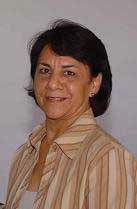

 THE Seychelles Nation, the daily newspaper published by the SPPF party and paid for by public funds, ran a message from the party on the occasion of Women's Day on March 8. As usual the article was in Creole so that English speaking foreign readers would not understand the (in) significance of the message.
THE Seychelles Nation, the daily newspaper published by the SPPF party and paid for by public funds, ran a message from the party on the occasion of Women's Day on March 8. As usual the article was in Creole so that English speaking foreign readers would not understand the (in) significance of the message.
The message was attributed to Mrs Sylvette Pool, the former Minister who has now replaced President Michel as organizing secretary of the SPPF. Mrs. Pool is described as the chairman of the SPPF Women's League in the article. Just how she got that post the article does not tell us.
In the article, Mrs Frichot is quoted as saying that it is not the first time that Seychellois women are facing difficulties. In the past, we surmounted all barriers she is reported as saying. What barriers Mrs. Frichot was alluding to was not clear. But after 33 years in power, 15 of which the SPPF ruled as a one party dictatorship, Mrs Frichot has difficulty explaining who are responsible for placing the existing barriers in the path of the women of Seychelles? The barriers of today are no doubt the disintegration of the political patronage system, the high cost of living, the stagnant wage levels of the workers and the fat salary increases of President Michel, his Ministers and members of the National Assembly.
A report by the World Bank (published in 1994), entitled Poverty in Paradise, documented succinctly the conditions of single mothers in Seychelles just 15 years after the coup d'etat of June 1977 and the introduction of a socialist economic system. According to the World Bank, despite the celebrated social welfare system introduced right after the 1977 so-called revolution, in 1992 poverty in Seychelles was too high for a middle income country. The World Bank pointed out that despite all the money paid out by the Social Security Fund, it did not get to those most in need.
Based on the statistics and household surveys produced by the Government itself, the World Bank study concluded the following:
1) Poor households tend to have the following characteristics: a) female-headed households where the head-of-household participates in Full-Employment Scheme; household headed by a school drop-out (once again mostly women who leave school because of teenage pregnancy or early marriage); c) other households headed by people without marketable skills; and d) households headed by retired people on limited pensions.
2) A disproportionate number of women are unable to find jobs because they lack technical skills. In 1991 women represented 2,685 of the 4,442 unemployed and most of them participated in the Full-Employment Scheme where they accounted for 90% of the participants. These women head most of the poor households in the country. This paradoxical situation, in a country where society is matriarchal and women have a great many rights, may be explained by the responsibilities many women face as single parents. High teenage fertility rates force women to drop out of school to look after children.
3) Pregnancy rates among teenagers and other young women, at ages where they should be most amenable to formal education and skills-training, are high and rising. Most of these mothers end up heading households in poverty. Even though overall economic growth is reducing poverty, these societal trends work to increase poverty.
4) The high fertility problem is compounded by the high frequency of teenage mothers who produce children out-of-marriage by several partners, often in rapid succession. These women are highly unlikely to be married and usually become single heads-of-household with little prospect of improving their lot.
The women of Seychelles 2008 are, still in the main, single mothers struggling to keep their heads above water. Many live in overcrowded accommodation provided for by the government. Many have little or zero income. There are reports that prostitution has become rampant in the government housing estates as the single mothers struggle to make ends meet.
Mrs Frichot unlike those featured in the World Bank report, has lived a privileged existence in Seychelles over the past 33 years. She has enjoyed a fat salary and state provided housing and other perks appropriate for a Minister in the Governmen